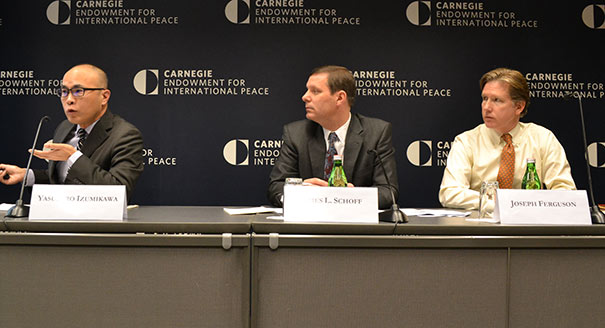Registration
You will receive an email confirming your registration.
During his tenure as Japan’s prime minister, Shinzo Abe has faced particularly challenging foreign policy issues in his own back yard. He is pursuing better relations with Russia during its confrontation with Europe and the United States over Ukraine, managing a wide gulf over historical and territorial issues with South Korea and China, and maintaining solidarity with the world vis-à-vis North Korea’s nuclear and human rights transgressions even while seeking to resolve cases of Japanese citizens abducted by the North.
Yasuhiro Izumikawa examined Abe’s foreign policy approach in Northeast Asia, with a particular focus on Russia, and explained the logic behind Tokyo’s strategic choices and the implications for Washington. Joseph Ferguson offered comments, and Carnegie’s James L. Schoff moderated.
Yasuhiro Izumikawa
Yasuhiro Izumikawa is a professor on the Faculty of Policy Studies at Chuo University in Japan where he lectures on international relations, East Asian security, and Japanese foreign policy.
Joseph Ferguson
Joseph Ferguson is an adjunct fellow with the Japan Chair at the Center for Strategic and International Studies in Washington. Recently he served as senior adviser in the Office of East Asia Policy and in the Office of NATO and Europe Policy at the U.S Department of Defense.
James L. Schoff
James L. Schoff is a senior associate in Carnegie’s Asia Program. His research focuses on U.S.-Japanese relations and regional engagement, Japanese politics and security, and the private sector’s role in Japanese policymaking.
